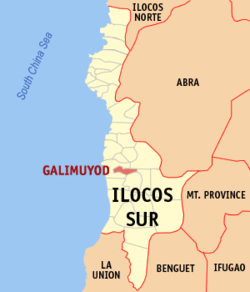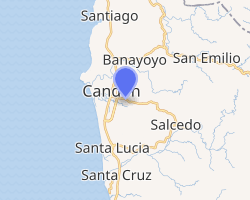Galimuyod
Galimuyod, officially the Municipality of Galimuyod (Ilocano: Ili ti Galimuyod; Filipino: Bayan ng Galimuyod), is a 4th class municipality in the province of Ilocos Sur, Philippines. According to the 2015 census, it has a population of 10,748 people.[3]
Galimuyod | |
|---|---|
| Municipality of Galimuyod | |
 Seal | |
 Map of Ilocos Sur with Galimuyod highlighted | |
OpenStreetMap 
| |
.svg.png) Galimuyod Location within the Philippines | |
| Coordinates: 17°11′N 120°28′E | |
| Country | |
| Region | Ilocos Region (Region I) |
| Province | Ilocos Sur |
| District | 2nd District |
| Barangays | 24 (see Barangays) |
| Government | |
| • Type | Sangguniang Bayan |
| • Mayor | Jessie Balingsat |
| • Vice Mayor | Moises T. Galangco |
| • Congressman | Kristine Singson-Meehan |
| • Electorate | 7,332 voters (2019) |
| Area | |
| • Total | 34.40 km2 (13.28 sq mi) |
| Population (2015 census)[3] | |
| • Total | 10,748 |
| • Density | 310/km2 (810/sq mi) |
| • Households | 2,313 |
| Economy | |
| • Income class | 4th municipal income class |
| • Poverty incidence | 13.01% (2015)[4] |
| • Revenue (₱) | 183,075,987.74 (2016) |
| Time zone | UTC+8 (PST) |
| ZIP code | 2709 |
| PSGC | |
| IDD : area code | +63 (0)77 |
| Climate type | tropical monsoon climate |
| Native languages | Ilocano Tagalog |
| Website | www |
Etymology
This town, formerly known as Cabisilan, was once the biggest barrio of Candon during the Spanish Regime. A land dispute between them and residents of neighboring Sapang, another barrio of Candon, resulted in a "gin-nuyod" (Ilocano for "tug-of-war") contest, a common game during those days, to settle it. The people of Cabisilan won over the people of Sapang, making Cabisilan the center of barrios near it. The old folks renamed the barrio Galimuyod, from the Ilocano words tali ("rope") and ginuyod ("pulled").
Barangays
Galimuyod is politically subdivided into 24 barangays. [2]
- Abaya
- Baracbac
- Bidbiday
- Bitong
- Borobor
- Calimugtong
- Calongbuyan
- Calumbaya
- Daldagan
- Kilang
- Legaspi
- Mabayag
- Matanubong
- Mckinley
- Nagsingcaoan
- Oaig-Daya
- Pagangpang
- Patac
- Poblacion
- Rubio
- Sabangan-Bato
- Sacaang
- San Vicente
- Sapang
Climate
| Climate data for Galimuyod, Ilocos Sur | |||||||||||||
|---|---|---|---|---|---|---|---|---|---|---|---|---|---|
| Month | Jan | Feb | Mar | Apr | May | Jun | Jul | Aug | Sep | Oct | Nov | Dec | Year |
| Average high °C (°F) | 30 (86) |
31 (88) |
32 (90) |
34 (93) |
32 (90) |
31 (88) |
30 (86) |
30 (86) |
30 (86) |
31 (88) |
31 (88) |
30 (86) |
31 (88) |
| Average low °C (°F) | 19 (66) |
19 (66) |
21 (70) |
23 (73) |
24 (75) |
25 (77) |
24 (75) |
24 (75) |
24 (75) |
22 (72) |
21 (70) |
19 (66) |
22 (72) |
| Average precipitation mm (inches) | 10 (0.4) |
10 (0.4) |
14 (0.6) |
23 (0.9) |
80 (3.1) |
103 (4.1) |
121 (4.8) |
111 (4.4) |
119 (4.7) |
144 (5.7) |
39 (1.5) |
15 (0.6) |
789 (31.2) |
| Average rainy days | 5.2 | 3.9 | 6.2 | 9.1 | 18.5 | 21.4 | 22.9 | 19.8 | 19.8 | 16.2 | 10.5 | 6.1 | 159.6 |
| Source: Meteoblue (modeled/calculated data, not measured locally) [5] | |||||||||||||
Demographics
| Year | Pop. | ±% p.a. |
|---|---|---|
| 1918 | 2,849 | — |
| 1939 | 3,063 | +0.35% |
| 1948 | 3,418 | +1.23% |
| 1960 | 4,670 | +2.63% |
| 1970 | 5,288 | +1.25% |
| 1975 | 6,281 | +3.51% |
| 1980 | 6,576 | +0.92% |
| 1990 | 7,941 | +1.90% |
| 1995 | 8,477 | +1.23% |
| 2000 | 8,879 | +1.00% |
| 2007 | 10,310 | +2.08% |
| 2010 | 10,011 | −1.07% |
| 2015 | 10,748 | +1.36% |
| Source: Philippine Statistics Authority[3][6][7][8] | ||
In the 2015 census, the population of Galimuyod was 10,748 people,[3] with a density of 310 inhabitants per square kilometre or 800 inhabitants per square mile.
References
- "Municipality". Quezon City, Philippines: Department of the Interior and Local Government. Retrieved 31 May 2013.
- "Province: Ilocos Sur". PSGC Interactive. Quezon City, Philippines: Philippine Statistics Authority. Retrieved 12 November 2016.
- Census of Population (2015). "Region I (Ilocos Region)". Total Population by Province, City, Municipality and Barangay. PSA. Retrieved 20 June 2016.
- "PSA releases the 2015 Municipal and City Level Poverty Estimates". Quezon City, Philippines. Retrieved 1 January 2020.
- "Galimuyod: Average Temperatures and Rainfall". Meteoblue. Retrieved 14 May 2020.
- Census of Population and Housing (2010). "Region I (Ilocos Region)". Total Population by Province, City, Municipality and Barangay. NSO. Retrieved 29 June 2016.
- Censuses of Population (1903–2007). "Region I (Ilocos Region)". Table 1. Population Enumerated in Various Censuses by Province/Highly Urbanized City: 1903 to 2007. NSO.
- "Province of Ilocos Sur". Municipality Population Data. Local Water Utilities Administration Research Division. Retrieved 17 December 2016.
External links
- Galimuyod Profile at PhilAtlas.com
- Pasyalang Ilocos Sur
- Philippine Standard Geographic Code
- Philippine Census Information
- Local Governance Performance Management System